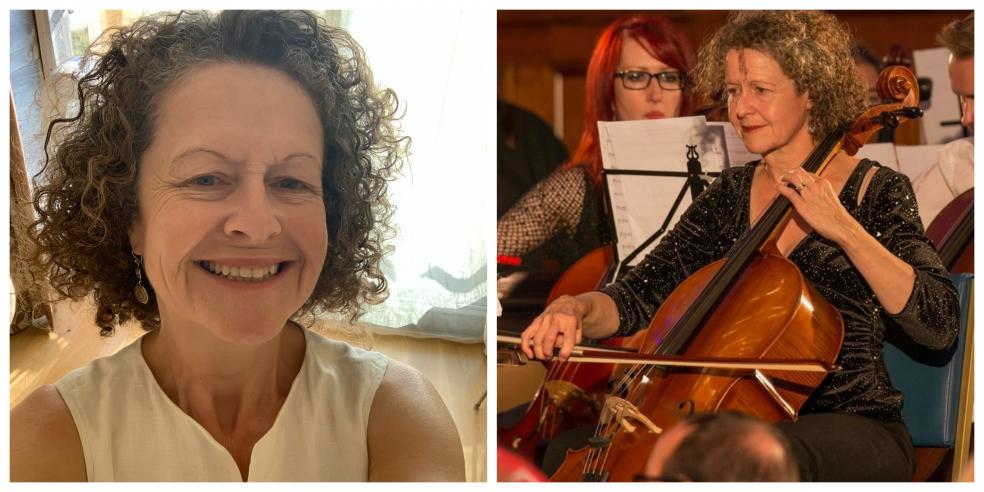
GP praises care at Peninsula NHS Treatment Centre
When Dr Susanne Charlton, 56, a GP at Port View Surgery, Saltash, cellist and novelist, needed treatment for trigger thumb and a carpal tunnel decompression, she turned to Peninsula NHS Treatment Centre in Plymouth.
Susanne, who lives in Launceston, and is also a clinical assistant in radiotherapy at Derriford Hospital, had been experiencing pain in her arm and hand on and off for over three years. She said: “It was becoming difficult at work, with driving and using the computer, affecting my cello playing and my sleep so that I was tired all the time. I’d had a couple of injections over the years which worked in the short term, but it became apparent that I might need surgery to resolve the problem.”
Susanne is now recovering from her operation at Peninsula NHS Treatment Centre and is looking forward to returning to her cello, which she plays with two orchestras, including the South West Peninsula Orchestra and Choir. “Getting full function back in my arm and hand will be important for my music,” she said, “especially the modern pieces we perform from musical theatre, films and gaming, which are often more difficult than traditional classical music."
Also she is hoping, one day, to start writing again, following the success of her novel “Without Borders, Syria.”
Of her care at Peninsula NHS Treatment Centre, Susanne says: “As a GP, I refer my patients to Peninsula, and I am also one of its satisfied patients. The experience as a patient is brilliant – the staff are lovely, helpful, friendly and professional and the hospital is efficiently-run and spotlessly clean.”
She added: “Whilst excellent quality of care and good outcomes are important, so too, is the welcome and friendliness of those who look after you – as a patient that makes you feel more at ease and confident in the care you are getting. For all of this, I would thoroughly recommend the Peninsula Treatment Centre”
Mark White, Hospital Director at Peninsula NHS Treatment Centre, added: “We are delighted to hear that Susanne is pleased with the care she has received from us. An outstanding patient experience sits at the heart of everything we do.”
Peninsula NHS Treatment Centre is well known for the quality of its patient experience and was the first hospital of its kind to achieve a rating of ‘Outstanding’ from the Care Quality Commission. Procedures include major and minor orthopaedic surgery, general surgery (hernia repair and gall bladder removal), cataract surgery, endoscopy and diagnostic imaging. Patients can choose Peninsula NHS Treatment Centre for their care under the NHS, and they can also elect for a self-pay option (cheaper than local private health providers) or in some cases private medical insurance.
www.peninsulatreatmentcentre.nhs.uk
Carpal tunnel syndrome – the 7 things you need to know
1 Carpal tunnel syndrome (CTS) is caused by compression of the median nerve, one of the nerves that controls feeling and movement in the hands. The median nerve travels through the carpal tunnel, which is a narrow passage in the wrist made up of small bones and soft tissue that act as a pulley for the tendons that bend the fingers.
2 CTS is a relatively common condition and symptoms include pins and needles, a weakness in the thumb and a dull ache in the hand or arm. Discomfort can be particularly evident at night. Little is known about what causes the compression of the median nerve but contributory factors seem to be: a family history of CTS; injury to the wrist; pregnancy; conditions such as rheumatoid arthritis and diabetes; repetitive use of the hand(s).
3 CTS can range from an inconvenience to a source of intense pain. A range of treatments are available and the treatment you may receive to deal with your CTS will depend in its severity and how long you have had it.
4 It is not likely to be necessary for you to have surgery immediately. Your treatment will begin with your GP, and then a referral to the musculo-skeletal physiotherapy service. Treatment may start with wrist splints to help keep your wrist in a neutral position. This prevents your wrist from bending and thus avoiding putting additional pressure on your median nerve. An improvement in symptoms may be noticed within four weeks. Your GP may send you home with a wrist splint, but they can also be bought from large pharmacies or on-line.
5 Your doctor may also suggest corticosteroid injections, especially if wrist splints have not worked for you. Steroids are natural hormones produced in the body that can help reduce inflammation. Corticosteroids can be taken in tablet form, although for CTS they are usually injected straight into the wrist. One injection is given to see if this is the right therapy for you. If one injection has proved effective but the condition returns (which it sometimes does) this form of treatment may be repeated after a period of time.
6 If your CTS has not responded to wrist splints or corticosteroid injections the next step may be surgery. You should discuss this with your GP and your surgeon to make sure that all other forms of treatment have been exhausted and that you are made fully-aware of the implications of surgery. This type of surgery is known as carpal tunnel decompression or carpal tunnel release. It is carried out as day surgery under local anaesthetic and takes about 20 minuted, which means you do not need to stay in hospital overnight. The carpal ligament, which is the roof of the carpal tunnel, is cut to remove pressure on the median nerve in the wrist. In most cases this type of surgery provides a complete cure.
7 After surgery your hand and wrist will be bandaged for 24-48 hours you should keep both elevated to reduce swelling – you will usually be asked to wear a shoulder sling. You will also be given some exercises by your physiotherapist to help with swelling and stiffness, such as gently moving your fingers, elbow and shoulder. This can begin on the day of your operation. You can start to use your hand and wrist for light duties provided there is no pain or discomfort. It is recommended that you avoid using your hand and wrist for any strenuous or heavy activities for at least six weeks after surgery, until you have completely recovered.













